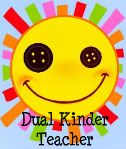I liked the term "developing reader" instead of labeling students as struggling.
"They may lag behind their peers on the reading-development continuum, but they are still on the same path." (p.25) Her answer to helping the developing reader? More reading.
"I have seen a heavy dose of independent reading, paired with explicit instruction in reading strategies, transform nonreaders into readers." (p.25)
Being a Kindergarten teacher, I am a teacher of emergent readers.
I hope to implement a book buddies program (see
here) that will help my students read more at home.
The "dormant reader" would best describe my son and oldest daughter.
My son is is so smart and I so was surprised to hear that he didn't like to read.
When I bought The Book Whisperer he was even curious to see if it could make him love reading.
My daughter has never voiced an opinion about reading, but she doesn't read.
I think this is probably where I would see myself also.
I'm not the avid reader that Donalyn Miller is, but I do love to read a good book.
My son did just finish reading a book that was recommended to him though.
Hmm, maybe I could just take them both to the bookstore and really encourage to look at books that may really interest them.
The "underground reader" is most definitely my younger daughter.
She loves to read. She devours books.
Summertime, free time, anytime is always a good time to read.
She's a sophomore in high school and has to read The Odyssey this summer,
but just told me today that she read a book a day last week and is now focusing a little more on her required reading. (And yup, she's enjoying that one too :)
"What I thought my students needed each week when I wrote my lesson plans was not as important as how I responded to their needs they expressed them to me." (p.21)
I am encouraged by this book, to really take a good look at my guided reading program
and to listen to the needs of my students and children.







